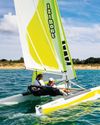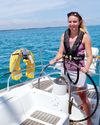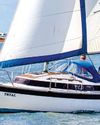
There are many methods of anchoring the loads from a yacht's standing rigging to her hull. But how often do any of us think to check them? Traditional wooden boatbuilding techniques persisted in many glassfibre yachts from the 1960s to the mid-1990s, which have the chainplates brought down through the deck and secured directly to a bulkhead. However, since the 1960s just about every boatbuilder has moved away from iron to stainless steel. Many yachts now use a flat bar of stainless with some form of plate welded on to create a deck seal, and sometimes a suitable cant (bend) above the deck to create the correct angle for the wire standing rigging, which reduces rig fatigue by lessening the 'working' of the wire.
Due to changes in rigs and production methods (and the desire to make the internal space of a yacht more open-plan), yacht designers have gradually moved away from relying on a bar bolted to a main bulkhead as the means to anchor it. Many builders have for years used a D-bolt, while others had nice A-bolts manufactured. In all cases there ought to be some form of hanger or rod that picks up the loading and anchors it to an internal stringer, strut, frame or form of bulkhead.
Boxing not clever
On several ranges of yachts, the designers have brought the chainplates through the deck, down into the saloon, and then boxed them in so they can't be seen.
While it may look good, it's a bad idea from an assessment point of view. I've attended a few rig failures on unsinkable yachts, where, on accessing the internal moulding, the chainplate roots were found bonded into the hull using a small, perforated stainless steel plate with a threaded bar welded to it. Water ingress, through a leaking deck seal, had soaked the plate which caused it to fail spectacularly from crevice corrosion.
Bu hikaye Practical Boat Owner dergisinin Summer 2023 sayısından alınmıştır.
Start your 7-day Magzter GOLD free trial to access thousands of curated premium stories, and 9,000+ magazines and newspapers.
Already a subscriber ? Giriş Yap
Bu hikaye Practical Boat Owner dergisinin Summer 2023 sayısından alınmıştır.
Start your 7-day Magzter GOLD free trial to access thousands of curated premium stories, and 9,000+ magazines and newspapers.
Already a subscriber? Giriş Yap

Orca sink yacht in Strait of Gibraltar
Spain's maritime rescue service, Salvamento Maritimo, has reported that a 15m (49ft) yacht sank in Moroccan waters in the Strait of Gibraltar following interaction with a pod of orca.

No kill cord or lifejackets were worn during fatal powerboat crash
A kill cord and lifejacket are useless unless worn-that's the warning from the Marine Accident Investigation Branch (MAIB), following its investigation into a powerboat crash that killed a 32-year-old woman and five-year-old girl on 2 October 2022.

Multihull sail work
Brush up on multihull sailing skills before heading off on charter with Gavin Le Sueur's guide to spinnaker handling, tacking and gybing

Five top causes of engine failure and how to prevent them
Jake Kavanagh talks to Sea Start marine engineer Nick Eales about how to avoid the five major causes of an engine breakdown at sea

Sail the Atlantic with strangers
Would you sail across the Atlantic with someone you've just met? Ali Wood meets the cruising crews who've done just that

IZIBoat: simple sailing
Rupert Holmes sails an innovative catamaran design intended to widen participation in sailing among those with little time to get on the water in more conventional craft

30 WAYS TO GET AFLOAT
From tall ships to small dinghies, you needn't own a boat to sail. Ali Wood looks at the options, and how skippers can also find crew

Boats for restoring under £20,000
Duncan Kent picks the best sub-35ft sail and power boats to look for when aiming to undertake a restoration on a budget

Seaworthy dinghies for less than £500
For low cost traditionally-styled GRP trailer-sailers, consider the Foreland and the Otter available at bargain basement prices

Playing with coloured sails
Maintaining an hourglass-shaped balloon and ratcheting up the log numbers